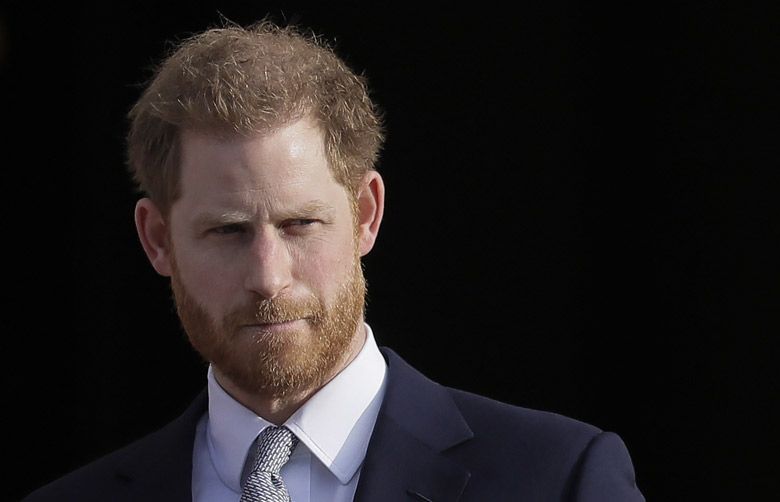LONDON — Britain’s charities’ regulator on Wednesday cleared Prince Harry of bullying, harassment and sexism at the charity he co-founded, following a monthslong dispute with the head of the organization that spilled out into the open.
Sophie Chandauka, the chair of the organization, made a series of allegations against Harry, his co-founder Prince Seeiso of Lesotho and the board of trustees after they resigned in March. She accused them of “abuse of power, bullying, harassment, misogyny and misogynoir,” a term that refers to sexism toward Black women.
The two princes stepped down in solidarity with five of the board’s nine trustees, who had quit after they lost confidence in Chandauka and called on her to resign. The former trustees also reported their concerns to the Charity Commission, the independent watchdog that oversees charities in England and Wales.
The dispute erupted into a public relations crisis and the commission opened an investigation into the accusations.
The regulator said in its report Wednesday that it found no evidence to support Chandauka’s claims of “widespread or systemic bullying or harassment.” The commission also said it found no evidence of “overreach” by Harry as patron or by Chandauka.
But the report criticized “all parties” for allowing the dispute to play out in public, including in television interviews, and said the organization’s poorly defined leadership roles contributed to the clash.
And it acknowledged “the strong perception of ill treatment felt by a number of parties to the dispute.”
“Sentebale’s problems played out in the public eye, enabling a damaging dispute to harm the charity’s reputation,” David Holdsworth, chief executive of the Charity Commission, said in a statement. He added: “Moving forward I urge all parties not to lose sight of those who rely on the charity’s services.”
The commission said that it had issued a regulatory action plan setting out steps that Chandauka and her new trustees must take to improve the charity’s complaints procedures, to establish clearer processes for delegating authority and setting out the importance of securing sufficient funding.
“The regulator is monitoring the charity’s progress against the regulatory action plan,” the statement said. “Should it receive evidence that raises new regulatory concerns, it will assess this in line with its usual process.”
When the commission announced its investigation into the charity’s compliance in April, Harry said he hoped it would “unveil the truth that collectively forced us to resign.”
A statement issued by Harry’s office on Wednesday welcomed the report’s finding that there was no evidence of bullying, but said that it fell “troublingly short in many regards.” The statement added that “the consequences of the current chair’s actions will not be borne by her — but by the children who rely on Sentebale’s support.”
The former trustees said in a joint statement that the commission had failed to properly investigate Chandauka’s management.
“We are disheartened by the way in which the Charity Commission has chosen to ignore key concerns and irrefutable evidence raised with them regarding the leadership and oversight of Sentebale’s chair,” the former trustees said, adding that they remained “gravely concerned” about the charity’s future.
Sentebale said in a statement that the charity felt “some degree of reassurance that the Charity Commission has not identified widespread bullying within the charity, but the commission has acknowledged the strong perception of ill treatment felt by a number of parties to the dispute and the impact this may have had on them personally.”
Chandauka said that the commission’s investigation had been “a test” for the organization. “We are emerging not just grateful to have survived, but stronger: more focused, better governed, boldly ambitious and with our dignity intact,” she added.
In March, after Harry resigned as patron, Chandauka claimed in a series of incendiary interviews with British news media that the prince’s decision was intended to damage Sentebale after he and the former trustees had failed to oust her. He strongly denied those claims.
After the trustees resigned along with the two princes, Chandauka appointed four new trustees. Only two remain, according to the charity commission’s records and the charity’s website.
A Zimbabwe-born lawyer who has worked for Morgan Stanley and Meta, Chandauka was named chair of Sentebale in July 2023 and had previously served as a trustee from 2009 to 2015.
When Chandauka made her accusations public, she described herself as a whistle blower, and reported the former trustees to the commission. Chandauka also filed a lawsuit against them at England’s High Court. Her office said it would ask to close the case following the results of the Charity Commission investigation.
Founded in 2006 in honor of the princes’ mothers, Sentebale raised funds for young people in southern Africa. At its establishment, the charity aimed to help communities affected by the HIV pandemic in Lesotho, one of the world’s poorest countries. It later expanded its work to nearby Botswana, and to addressing substance abuse, gender-based violence and other issues facing young people.

